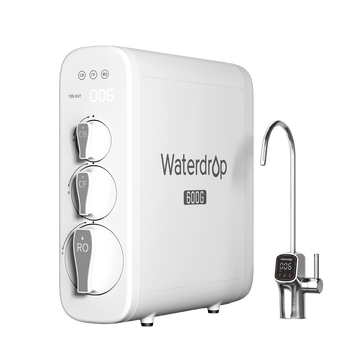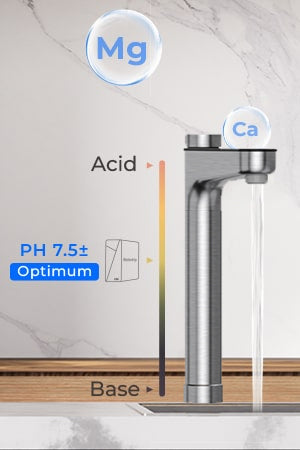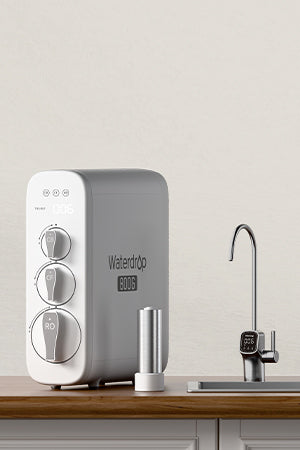El tipo de agua que consumimos puede tener un impacto significativo en nuestra salud, preferencias gustativas e incluso en el medio ambiente. A medida que los consumidores se preocupan más por su salud y el medio ambiente, crece el debate: ¿Es el agua de ósmosis inversa (OI) mejor para la salud que el agua embotellada?
En este artículo, analizaremos las diferencias entre el agua de ósmosis inversa y el agua embotellada, centrándonos en sus beneficios para la salud, su impacto ambiental y su rentabilidad. También analizaremos por qué el agua de ósmosis inversa podría ser la mejor opción para quienes buscan agua más limpia y segura, respetando la sostenibilidad.
¿Qué es el agua de ósmosis inversa?
Antes de comparar el agua de ósmosis inversa con el agua embotellada, exploremos primero qué es realmente el agua de ósmosis inversa.
Entendiendo el agua por ósmosis inversa
La ósmosis inversa es un proceso de filtración de agua que utiliza un
membrana semipermeable Para reducir contaminantes, impurezas y partículas del agua. Este método de filtración reduce eficazmente sustancias nocivas como el cloro, el plomo, las bacterias e incluso algunos virus. El proceso consiste en impulsar el agua a través de una membrana a presión, separando las partículas no deseadas y enviando agua limpia para su consumo.
¿Por qué elegir agua de ósmosis inversa?
Hay varias razones por las que usted podría elegir agua de ósmosis inversa.
- Pureza: El proceso de filtración por ósmosis inversa reduce eficazmente los productos químicos nocivos, los metales pesados y los contaminantes, lo que garantiza que el agua de ósmosis inversa sea más limpia y saludable para beber en comparación con muchas otras fuentes de agua.
- Consistencia: A diferencia del agua del grifo, cuya calidad puede variar debido a las prácticas locales de tratamiento del agua o factores ambientales, el agua de ósmosis inversa ofrece una pureza constante en cada vaso, lo que le da tranquilidad sobre el agua que consume.
- Conveniencia: Al invertir en un sistema de filtración de agua por ósmosis inversa, puede disfrutar de agua purificada y de excelente sabor directamente del grifo, eliminando la necesidad de agua embotellada y la molestia de reponerla constantemente.
Agua embotellada: conveniencia vs. calidad
Si bien el agua embotellada se ha convertido en una opción preferida para muchas personas debido a su conveniencia y disponibilidad, es esencial considerar si es la opción más saludable y sustentable.
Calidad del agua embotellada
La calidad del agua embotellada puede variar significativamente según su origen. Algunas aguas embotelladas provienen de manantiales naturales, mientras que otras provienen de suministros municipales de agua del grifo, que han sido parcialmente filtradas. Desafortunadamente, el agua embotellada no siempre se somete a los mismos rigurosos procesos de purificación que el agua de ósmosis inversa, lo que significa que aún puede contener trazas de sustancias químicas, bacterias u otros contaminantes, según la marca y los métodos de filtración utilizados.
Preocupaciones ambientales
Además de los posibles problemas de calidad, el agua embotellada tiene un impacto ambiental significativo. La producción, el transporte y la eliminación de botellas de plástico contribuyen a la contaminación plástica global. Si bien muchos países han avanzado en el reciclaje y la reducción de residuos plásticos, lo cierto es que el agua embotellada representa una gran parte de los residuos plásticos.
- Botellas de plástico: Cada año se utilizan millones de botellas de plástico para embotellar agua, muchas de las cuales terminan en vertederos o en el océano, lo que agrava el problema de la contaminación plástica.
- Huella de carbono: La producción y el transporte de agua embotellada contribuyen a las emisiones de gases de efecto invernadero, que tienen un efecto perjudicial sobre el medio ambiente.
En comparación, el agua de ósmosis inversa es una opción ecológica, ya que no requiere botellas de plástico y reduce significativamente la huella ambiental asociada al consumo de agua.
Comparación del agua de ósmosis inversa y el agua embotellada: las diferencias clave
A continuación se muestra cómo se compara el agua de ósmosis inversa con el agua embotellada en términos de beneficios para la salud, sabor, costo e impacto ambiental.
Beneficios para la salud
En cuanto a la salud, muchos consumidores se preguntan si el agua de ósmosis inversa es una opción más saludable que el agua embotellada. Una comparación de sus respectivos beneficios para la salud revela diferencias clave que vale la pena considerar.
Pureza y seguridad
El agua de ósmosis inversa se considera una de las formas más puras de agua potable, ya que reduce eficazmente contaminantes como metales pesados, cloro y bacterias. Por el contrario, el agua embotellada puede no someterse al mismo nivel de filtración y contener trazas de cloro, microplásticos u otros contaminantes, dependiendo de su origen y procesamiento. Aunque a menudo se comercializa como "pura", el agua embotellada no suele recibir un tratamiento tan riguroso como el agua de ósmosis inversa, lo que la convierte en una opción más fiable para los consumidores preocupados por su salud, especialmente para quienes tienen sistemas inmunitarios sensibles.
El papel de los minerales
Una posible desventaja del agua de ósmosis inversa es que el proceso de filtración elimina minerales beneficiosos como el calcio, el magnesio y el potasio. Si bien algunos temen que esto pueda causar deficiencias de nutrientes, muchos sistemas de ósmosis inversa, como el Waterdrop X12, lo solucionan con filtros de remineralización que restauran los minerales esenciales. El Waterdrop X12 infunde minerales alcalinos y ajusta el pH a un valor óptimo de 7,5 ±, lo que garantiza que disfrute de la pureza y los beneficios para la salud del agua rica en minerales, con la comodidad adicional de un flujo rápido.
En cambio, el agua embotellada suele contener estos minerales de forma natural, especialmente el agua de manantial o mineral. Algunas marcas incluso añaden minerales adicionales para darle sabor, lo que resulta atractivo para quienes prefieren un agua con un sabor más intenso.
Impacto ambiental
A medida que los consumidores buscan reducir su huella de carbono, la ósmosis inversa
sistemas de filtrado de agua Ofrecer una alternativa más sostenible al agua embotellada.El agua embotellada contribuye significativamente a la contaminación plástica, y muchas botellas terminan en vertederos o en los océanos a pesar de los esfuerzos de reciclaje. Además, la producción de agua embotellada requiere recursos valiosos como agua, energía y envases.
Por el contrario, los sistemas de ósmosis inversa utilizan menos energía, no generan residuos plásticos y proporcionan una solución más limpia y ecológica para la hidratación.
Costo
Si está considerando cambiar al agua de ósmosis inversa, también es importante considerar el costo. Aunque el agua embotellada pueda parecer económica a primera vista, los costos se acumulan con el tiempo. El agua de ósmosis inversa resulta mucho más rentable que el agua embotellada.
Conveniencia
En cuanto a comodidad, el agua embotellada sigue siendo la mejor opción. Es fácil comprar una botella en el supermercado o tomar una bebida fría para llevar. Sin embargo, esta comodidad tiene un precio, tanto económico como ambiental.
Con el agua de ósmosis inversa, una vez instalado el sistema, podrá disfrutar de agua purificada directamente del grifo en casa, lo cual no solo es práctico, sino también más ecológico. Si se compromete a reducir su consumo de plástico, el agua de ósmosis inversa es la solución ideal.
Conclusión: ¿Es el agua de ósmosis inversa mejor para usted?
El debate entre el agua de ósmosis inversa y el agua embotellada depende, en última instancia, de sus prioridades. Si la salud, la sostenibilidad y el ahorro a largo plazo son importantes para usted, el agua de ósmosis inversa es la mejor opción. Proporciona agua más pura, reduce su impacto ambiental y es una opción más rentable a largo plazo.
Si bien el agua embotellada ofrece comodidad y un alto contenido mineral, su impacto ambiental y los posibles riesgos de contaminación la hacen menos adecuada para quienes se preocupan por la salud y el medio ambiente. Así pues, ya sea que viva en las bulliciosas ciudades del Reino Unido, las pintorescas regiones de Francia o los centros urbanos de Alemania, el agua de ósmosis inversa ofrece una excelente alternativa al agua embotellada, ayudándole a mantenerse hidratado y a tener un impacto positivo en su salud y el medio ambiente.


























































